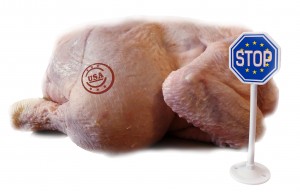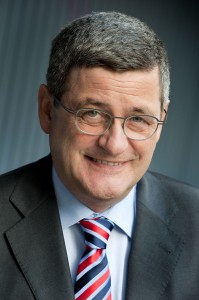Tichy’s Commentary
The Market of Dreams
In June, negotiations over the Transatlantic Free Trade Agreement are set to begin – a virtuous undertaking, worth the sweat upon the noblest brow. Free trade could lead to a half percentage point of economic growth for foundering Europe, thus finally providing the boost we need to climb out of the deep valley of debt. President Barack Obama has revived this idea, as ancient as it is convincing, and thus placed himself in the tradition of the true greats, among whom he has long been counting himself. And in fact, the first negotiations on this issue were initiated by the great men of the past – Konrad Adenauer, the legendary first chancellor of Germany after the war, Charles de Gaulle, the architect of France’s Fifth Republic and, on the American side, no lesser man than John F. Kennedy himself. These heroes of politics, whose names our children learn to recite reverently, were stymied by chickens.
Small gifts go a long way
That’s right – chickens, hens and roosters, dead and frozen. Charles de Gaulle feared neither death nor the devil, but he did fear the French farmers’ lobby, which was dead-set against the import of poultry from the United States. And Konrad Adenauer resisted Stalin and his armed divisions and paid the price of the division of Germany. But, to achieve lofty deeds in world history, one needs friends … better yet, good friends. And small gifts go a long way toward sustaining friendships – which is where the chickens for Charles de Gaulle come into play. The protocols of the negotiations over the Elysée Treaty between 1961 and 1963, the German-French friendship agreement that is one of the pillars on which contemporary Europe rests, contain extensive debates over chickens’ frozen legs, thighs, wings, and breasts, and the terms at which they may cross the Atlantic ocean untaxed. They may not, to make this story short. Since then, a multitude of new approaches have been tried. All have failed.
The world has grown more complex, more colorful and more diverse. The basic issues have not – only their expression has changed. And so it came that today, the issue is no longer confined to chickens. Europe has banned the import of genetically modified corn and soybeans, hormone-treated meat and chicken thighs – there they are again – which in the United States may be dipped in chlorine to kill germs. The agricultural lobby is the original special interest, and others have learned from it. Take the automakers, for instance. In the United States, rear blinkers may be red. In Europe, they must be yellow. European cars must be able to fold in their side mirrors because Italy is full of narrow, winding alleys. US cars can roam the wide expanses with their mirrors spread like wings. It would be nice if one crash test were valid on both sides of the great, watery ditch that separates us. But it doesn’t. It’s complicated.
 Mobility for innovation and growth
Mobility for innovation and growth
It will be the achievement of the century when the task of harmonizing contradictory regulations based on special interests is completed. As they say, it was easier to bring down the Berlin Wall than it would have been to standardize its construction principles across the Atlantic. And that would just be the beginning when it comes to moving these regulatory tectonic plates closer together. A free trade agreement, with all its pitfalls and provisos in norms and standards would only be a stepping stone towards achieving a truly functional single transatlantic market deserving of this name. A market that is truly a single one, and can thus truly promote growth, will only be achieved when people and workers can also move freely, back and forth or forth and back. Labor mobility in the actual sense of the word creates jobs and exchange. This has never been as true as it is today in the age of information capitalism. People are the carriers of the essential economic factor, knowledge. Only their mobility facilitates innovation and growth at the other end of the large world we share. Europe has some experience in this area; it has been painful and contradictory. As the borders within the EU open toward the member states Bulgaria and Romania, Germany wants to close them out of fear of a mass migration to the social-welfare hammock that is Germany. After all, state-funded support paid each month to the parents of one child in Germany is equal to an average monthly salary in Romania. But this would be a difficult issue for the United States and Barack Obama as well. Obama is pursuing a somewhat restrained immigration strategy; he prefers to spend his political capital elsewhere and not on the Mexican border.
However, great men grow in proportion to the task ahead of them. With our eyes on the prize, let’s not let anyone argue it to pieces until it’s no more than chickenfeed. That’s why we are looking forward to June. At any rate, we will see some lovely conferences happening, where the participants negotiate on all of the points each lobby views as non-negotiable.
Roland Tichy is editor-in-chief of Germany’s leading economic weekly Wirtschaftswoche and a regular columnist for JVG

